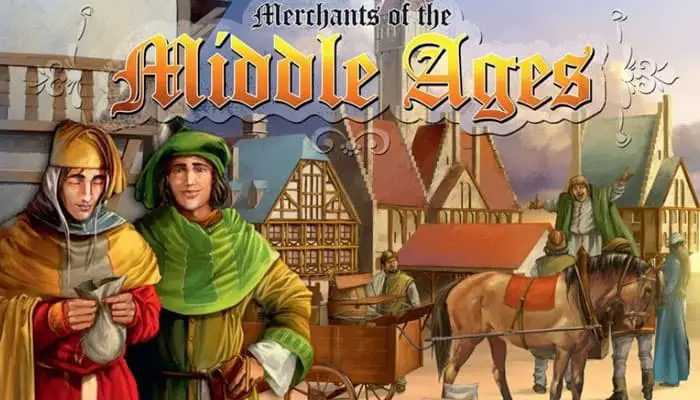
Components

- 1 Board
- 3 Wooden wagons
- 54 Goods in 6 colors
- 1 Wooden Courier pawn
- 16 Coat of arms tiles
- 4 Sets of movement tiles
- 4 Price wheels
- 8 Investment cards
- 21 Influence cards
- 5 Letter of Credit cards
- 6 Bonus markers
- 2 Gray cylinders
- 1 Turn Sequence board
- 100 coins
- 4 Screens, to hide the florins
- Rulebook
Object of the Game
Europe during the Middle Ages. You are a merchant, owner of important markets in 6 majestic cities of Europe. At the heart of this commercial trade are 6 different kinds of goods: cloth, iron, wine, food, silk and salt.
These goods are, as much as possible, acquired at a low price. They are then transported by wagon to another city where, if the market is properly managed, they will be sold for a considerable profit.
And what do you want to do with all that money? Make a name for yourself by raising your social status. At the end of the game, the player who managed to make the most prestigious name for himself wins the game.
Game Board
There are six cities on the board, each with one warehouse per player, identified with his coat of arms. Every city has a marketplace with 3 different goods illustrated in it; only these 3 specific goods may be purchased in that city.
There is also a bonus track above each city (ranging from 0 to 500). Roads with many spaces connect the different cities. The following information is also represented on the board:
A Price chart, with the cost and selling price for each good.
B Wagon track with the number of arrived wagons and the status cost to climb to the next status level.
C Status table (representing the social climb) with an upkeep, for each level, to maintain the social status.

D The 8 Investment cards are shuffled. Draw 4 cards and place them face up near the board. The other Investment cards are stacked face down and placed beside the face up cards.
E The Letter of Credit cards are piled face up the other cards.
F The 21 Influence cards are placed in a pile near the game board.
G Place 1 of each of the six goods on the lowest line (100/600) of the Price Chart. The remaining goods are placed beside the board.
The 3 empty wagons are placed in Paris, Koln, and Geneva OR in Geneva, Brugge, and Wien. There can only be one wagon in each city. The courier is placed 2 spaces away from an empty city (no wagon in it).
H Place a gray cube (bonus marker) on the "200" space of the bonus track of each empty city. In the cities with a wagon, put the bonus marker on "0".
The first player changes at the beginning of every turn. He always receives the Turn Sequence board and a gray cylinder. For the first turn, determine a first player with the method of your choice. The first player puts the cylinder on the Purchasing space of the board (Action 1).
I A gray cylinder is placed on the first space of the Wagon Track. It is used to count the number of wagons that reached a city.
At the beginning of the game, each player receives (in his color):
- 1 screen to hide his money during the game.
- 1 set of movement tiles (numbered 1 to 4) that he puts face up in front of his screen.
- 4 coat of arms tiles, one of which must be placed on the lowest level of the status table. He keeps the others in his play area.
- 1 price wheel (with 2 arrows).
- Each player also receives 5,000 florins as their starting capital ( 3 x 1,000; 3 x 500; 5 x 100). The rest of the money is separated in 3 piles and placed beside the board: this is the bank.
Game Play
Action 1: Purchasing Goods

Purchased goods are stored in the players' various warehouses.
Starting with the first player and continuing clockwise, each player may buy 0 to 3 goods, paid to the bank.
Kinds of goods: A player may buy one or more kind of good from the supply. If a given type is no longer available in the supply, the players must either buy another type of good or wait and hope for the best.
Price: Players pay the current cost to the bank. The cost is located on the left side of the price chart. During the first turn, the goods all cost 100 florins each.
Storage: Purchased goods are stored in the players' warehouses. However, only the 3 kinds of goods shown in the city's marketplace can be stored in that city. As long as he respects the city's marketplace, a player may store as many goods as he likes in each of his warehouses.
Note: Players should buy / store their goods in a city where there is an empty wagon or a city where a wagon is about to arrive.
In the first turn, this action is done twice. This means that after Action 1 of the first turn, a player can have up to 6 goods in his warehouses.
Hint: It is highly recommended that you acquire 6 goods during Action 1 of the fi rst turn.
Investment Card: Reduced Cost
The player who owns this card (Investment cards can be obtained during Action 6) only pays 100 florins when he buys any number of goods in a turn.
This means that for the remainder of the game, when this player purchases any quantity of goods (1, 2 or 3), he will only pay 100 florins per turn during Action 1.
Action 2 - Auction
for loading master title and loading wagons
This action is only carried out when there is at least 1 empty wagon in a city. Otherwise, skip this action.
If there is an empty wagon in one or more cities, the Loading Master title for each of these wagons is auctioned off. The wagons are then loaded in ascending order, starting with Wagon 1.
The auctions determine the Loading Masters for the different wagons. The Loading Master has many privileges, including loading priority, and monopoly on one good.
1 - Auction for the Loading Master Title:
Each player bids as many florins as he wants in a closed-fist auction. The players put the number of florins they want to bid in their closed hand. When they are ready, they all reveal their bid at the same time and the highest bidder becomes the loading master.
This player pays his bid to the bank while the other players put their bid back behind their screen. The loading master then puts one of his Coat of arms tile on the city where he is the loading master. This tile will go back in his supply once the wagon leaves the city.
Players are allowed to bid 0 (in which case they have no florin in their hand).
- Ties: Ties are broken off with the playing order, starting with the first player.
- No bid: If no players bid, the first player wins the auction.
Example: An empty wagon is in Koln. In turn order, the players bid the following amount: Stephen (first player) bids 1,200; Christian 1,300; Matt 500; and Alice 1,300 florins.
The highest bidders are Christian and Alice. Since Christian is the second player and Alice the fourth one, Christian becomes the Loading Master and pays the bank 1,300 fl orins.
2. Loading a Wagon:
The loading master first loads the wagon with up to 3 goods of one kind, for free, from his warehouse to his loading space on the wagon (the one with his coat of arms).
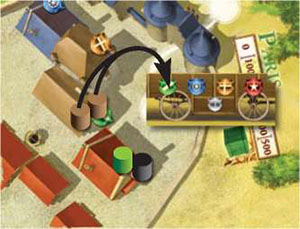
The player loads his goods from his warehouse to his loading space.
The other players may only load up to 2 goods on their loading space. Unlike the loading master, they can load more than one kind of good, but they cannot load the same type of good that the loading master put on the wagon. For all intents and purposes, the loading master has a monopoly on the kind of good he loads on the wagon.
The cost for loading the wagon is negotiated between the loading master and the players. The agreed upon price is immediately paid to the loading master.
The loading master may settle on a different price with each player. He may also offer a variable price, depending on the number of goods loaded (for example, 1 good for 300 and 2 goods for 500).
3. How long does a player stay loading master:
A player stays loading master as long as the wagon is in the city and that it is still possible to load goods on it, provided that the monopoly and capacity constraints are observed (3 goods for the loading master, 2 goods for each other player).
Example: There is a wagon in Koln. The following goods are produced/ available in this city: Wine (brown), Silk (purple) and Iron (black). The loading master (the blue player for instance) loads 3 silk.
After negotiating with the loading master, the orange player agrees on a price of 400 florins to load 2 goods: orange pays the loading master and then puts 1 Iron and 1 Wine on his loading space.
Red, who is not as thrifty a negotiator as orange, settles on a price of 500 florins for 2 goods: he pays the 500 florins and loads 2 Iron on his loading space.
Finally, the green player, who only has silk in his warehouse in Koln, does not bother negotiating with blue since he cannot load his goods on the wagon.
Action 3 - Wagons And Courier Movement
Moving a wagon
 With the "3" movement tile, the wagon is moved forward 3 spaces. |
Each player may move a wagon, even if it is empty. The following rules must be observed:
Moving forward: Wagons always move forward (the direction that the driver's seat is pointing). A wagon may never move back, even when it reaches a junction.
Branching paths: The player who reaches a junction decides which path the wagon takes.
+There can never be more than one wagon on a space. This also applies to city spaces.
Passing and crossing: It is possible to cross and pass another wagon; in these cases, the occupied space counts as a normal space in the movement.
The wagons are only moved with movement tiles and the 2 Coach driver Investment cards.
Choosing a Movement Tile
Each player has 4 movement tiles with values ranging from 1 to 4. The active player chooses one of his movement tiles and then moves one wagon the corresponding number of spaces.
Movement points may not be allocated to more than one wagon. The used tile is turned face down and set aside for now. After 4 turns, all the tiles will have been played (the coat of arms on all of them will be visible); they become available again at this time and they are all turned face up.
A wagon must always move as far as possible, no matter the tile used.
Movement Points may be lost:
If a wagon ends its move on a space occupied by another wagon, the moving wagon must stop and is left on the space before the occupied one. In this case, exceeding movement points are lost.
Movement points are also lost when a wagon arrives in a city.
Important:
Once a player plays a movement tile, he must move a wagon as far as possible. He may not choose to move a wagon that has no legal destination when another wagon could be moved to another location.
A player may choose to move a wagon that will not use all of its movement points.
A wagon that reaches a city can only move on the following turn, after being unloaded.
In rare circumstances, a situation where no wagon can move may occur. For instance, if all 3 wagons reached a city this turn or if 2 back-to-back wagons are heading towards an occupied city. In these rare cases, players must still play a movement tile, although the movement points will all be lost.
Investment Cards: Driver and Coach Driver
A player who acquired the Driver card during Action 6 will have, for each of the following turns,
1 extra movement point. The player who owns the Coach driver card has 2 extra movement points. These bonus movement points may be used to move any wagon, even one that was already moved by the player this turn. The Coach driver can either move one wagon 2 spaces or two wagons 1 space.
Important :
The Driver and Coach driver cards can be used at anytime during their owner's turn, even before or after he uses his movement tile.
A wagon that allowed the active player to receive an Influence card (by meeting the courier) may not be moved again by this player this turn.
Moving the courier and obtaining Influence Cards
 The courier can only be moved by using either the Courier or Express Courier cards. |
The courier can only be moved by using either of the 2 Investment cards that can be won in the auctions during Action 6. These cards are Courier (1 movement point) and Express Courier (up to 2 movement points).
If the courier ends its movement on a space occupied by a wagon, the active player receives one Influence card (as described below). The courier can move in any direction, but he cannot move in a city. The courier can move before or after the wagon.
Influence Cards:
There are 7 different Influence cards and 3 copies of each. An Influence card gives its owner significant advantages.
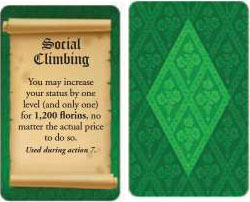 Influence card |
Obtaining an Influence Card:
A player can obtain an Influence card only if he is the active player and if:
a wagon ends its movement on the space occupied by the courier, or
the courier ends its movement on a space occupied by a wagon.
The player who succeeds in having the courier and a wagon meet immediately chooses 1 Influence card from those that are still available. The player keeps it hidden from the other players (behind his screen for instance).
He will be able to use this card once later in the game. The effect of the card and the action during which it can be used are indicated on the card. Influence cards are removed from the game once played.
A player may own as many Influence cards as he wants. He may also play more than one Influence card at any given time. If more than one player want to play a card at the same time, the cards will be played in turn order, starting with the first player.
Action 4: Price Adjustment and Warehouse Sales
The cost of a good is indicated on the left column of the price chart (100 - 100 - 200 - 300 - 400) whereas the selling price is shown on the right column (600 - 700 - 800 - 900 - 1000).
Price Wheel:
Every player decides at the same time the price of which goods he will increase. This choice is made secretly, using the two arrows on the wheel. These two arrows can either point at two different goods or they can both show the same good. The goods indicated by the arrows go up by 1 or 2 levels, depending on the number of arrows pointing at them. If a player does not want to change the price of 1 or 2 goods, he aligns the arrow(s) of his wheel with his coat of arms.
Price Changes:
The players reveal their wheel at the same time and the prices are changed accordingly: the cost of a good will move up 1 step on the price chart for every arrow that points at it. If a good on the highest level (400/1,000) has to move again, it will simply start back at the bottom of the chart (100/600).
Investment Cards: Office And Large Office
After the prices have been adjusted with the wheels, a player who owns either of these cards (acquired during Action 6) can raise or lower the price of one good by one step.
Only the owner of the Large Office can make a good go from the lowest level to the highest level or vice versa (from 600 to 1,000 or 1,000 to 600).
If the Office and the Large Office are owned by different players, they are used following the regular turn order.
If one player owns both cards, he may adjust the price of one good by 2 levels or the price of two goods by 1 level. However, there is still only one good that can go from the top of the chart to the bottom or vice versa.
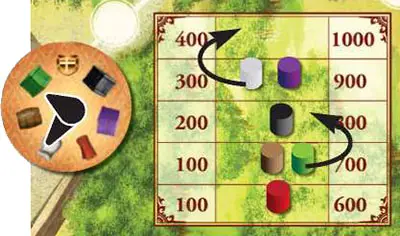 The green and the white good go up 1 level on the price chart. |
 The white good goes up 1 level. Since it already is on the highest level, it drops down to the lowest level. |
Investment Card: Warehouse Sale
Once all prices are adjusted, the player who owns the Warehouse Sale card (acquired during Action 6) can sell up to 5 goods from his warehouses. He sells these goods to the bank for their current cost. Sold goods go in the supply.
Action 5: Unloading the Wagons and Selling Goods
This action only occurs when one wagon or more arrived in a city.
1. Indicating The Arrival Of A Wagon
For every wagon that reaches a city, the marker on the Wagon Track is moved up 1 step.
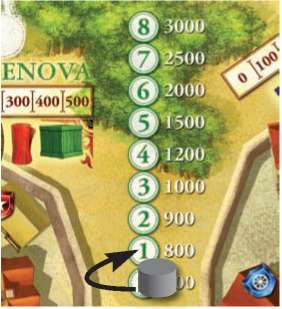 Each time a wagon enters a city, the gray marker is moved up one step on the Wagon Track. |
2. Selling Goods
All the goods that have just arrived in a city are now unloaded and sold to the bank. Price: For each good sold, the bank pays the seller the current selling price of his good.
Bonus: If a kind of good sold in a city is not available in this city's marketplace, the seller receives, for each of these goods, a number of florins equal to the current bonus indicated on this city's bonus track.
Sold goods are returned to the supply. Empty wagons are turned so they are now facing the road and ready for the following turn's Loading Master title auction.
If more than one wagon enters a city, they are unloaded in their respective order (i.e. first unload Wagon 1, then Wagon 2 and finally Wagon 3).
3. Adjust the Bonus Tracks
Once every wagon has been unloaded, the bonus tracks in cities where there is a wagon are reset to 0. In empty cities, the bonus marker moves up 1 space for every wagon that reached a city this turn.
Once a bonus marker is on the last space of its Bonus Track (500), it stays there until a wagon arrives in this city
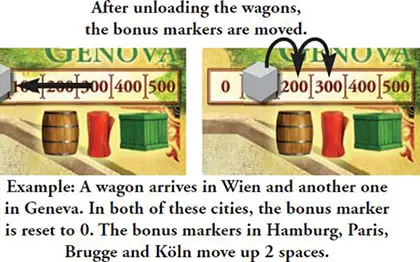
Unloading example in Brugge: A wagon rolls into Brugge. There is, among other things, Wine on this wagon; a kind of good not produced in Brugge. Wine is currently sold for 600 florins and the Brugge bonus track is presently set on 300.
Therefore, each Wine sold in Brugge during this action is worth 900 florins.
Action 6: Investment Cards
There are 8 Investment cards in the game. They give their owner various abilities starting on the turn following their acquisition and for the rest of the game.
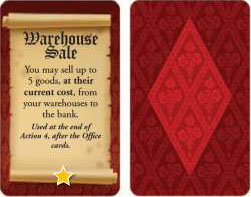 Investment card |
The Investment cards are auctioned off. Four face up cards are available for the first auction of most turns.
Hint: The lower section of each card shows 1 to 4  . These stars indicate the value of the card and act as a guide for players to know how much they should bid in their first few games.
. These stars indicate the value of the card and act as a guide for players to know how much they should bid in their first few games.
Even though 1000 florins may be a good price for a 3  card, the value of each card will depend a lot on the current situation. As such, the value of each card will most likely vary a lot from one game to the other.
card, the value of each card will depend a lot on the current situation. As such, the value of each card will most likely vary a lot from one game to the other.
To acquire an investment card, these rules must be followed:
For as long as it is possible, the first auction of every turn contains 4 cards. After, there will be fewer than 4 cards until all the cards are acquired by the players or until there are only unwanted cards left.
Each turn, there is one fewer auction than the number of players. In other words, in a 4-player game, 3 cards are auctioned each turn; in a 3-player game, 2 cards; and in a 2-player game, 1 card. Subsequently, there will always be at least one player per turn who does not get a card.
A player may not win more than 1 card per turn. He can also refuse to bid on any card during a turn.
The player with the highest bid chooses one of the face up cards. He keeps it in front of himself for the whole game and he can use it every turn. The other players then continue the auction with the remaining face up cards.
At the end of the auctions, replenish the face up auctioned cards to 4. If there aren't enough cards, draw as many as possible.
The Investment Card Auction Round:
The current first player (the one with the Turn Sequence board) says how much he is willing to offer for one of these 4 cards.
If he foregoes his right to bid, the next player to his left starts the bid; if he decides to bid, he must offer at least 100 florins or an amount that can be divided by 100.
Clockwise, the other players can either pass or offer more, as long as it is a multiple of 100 florins. This continues until there is only one player left. The player who bid the most pays his bid to the bank and takes the card of his choice.
Then, following the player order, the next player who has not won a card yet starts another auction or passes. This auction round ends once every player
The auction round ends when every player but one has won a card. The auction round also ends if every player passed and thus no bid was made. Once all 8 Investment have been obtained, Action 6 is skipped for the remainder of the game.
Action 7: Upkeep And Raising Social Status
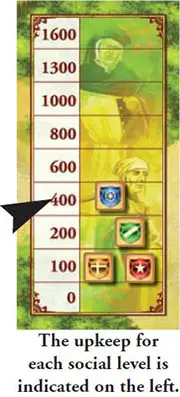
Upkeep
Starting with the first player and following turn order, every player must pay his upkeep to the bank. The upkeep is indicated by the position of the players' coat of arms on the status table.
If a player is unable to maintain his current status, he must lower his coat of arms as many levels as necessary to reach a status level he can pay for.
Example: A player who reached 1,000 must pay 1,000 fl orins. Since he only has 700 fl orins, he must drop his social title to 600 and pay 600 fl orins to maintain this status.
Letter of Credit
A player who lowers his social status is eligible to a 2,000-florin loan from the bank; by doing so, he also contracts a Letter of Credit card that he must keep face up in front of his screen.
This is the only way a player may obtain a loan. A player can take more than one loan, but only one per turn. As long as a player possesses any Letter of Credit, he cannot raise his social status. A loan may be reimbursed at any time by paying the bank 2,500 florins.
At the end of a game, if a player still has any Letter of Credit left to reimburse, he will be considered the last player, no matter his actual position on the status table. If more than one player still have loans at the end of the game, their social status acts as a tie breaker and failing that, their wealth.
Raising Social Status
Once the upkeep is paid, each player may decide to raise his social status. The price to raise one's social status is indicated on the wagon track. A player may raise his status up to 2 levels per turn. He pays the price for each level.
Example: Three wagons entered a city this turn. The Wagon marker is moved up three levels. A player who wants to increase his social status must pay 1,000 fl orins per level (i.e. 2,000 fl orins if he wants to go up 2 levels).
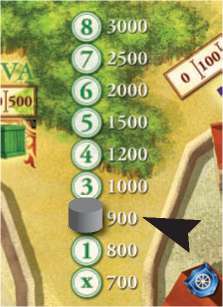 The cost to raise one's social status increases every time a wagon enters a city. |
New Turn
The turn ends after Action 7 and another one starts right after. The Turn Sequence board and its marker are given to the player to the left who becomes the new first player.
The new turn begins with Action 1.
End of the Game
The end of the game depends on the number of players:
- 2-player game: The game ends when 6 wagons have entered a city.
- 3-player game: The game ends when 7 wagons have entered a city.
- 4-player game: The game ends when 8 wagons have entered a city.
The last turn is always completed. In other words, the game always ends after Action 7 (Upkeep and Raising Social Status) of the turn where the last required wagon entered a city.
Players are thus able to raise their social status by another 2 levels before the end of the game, provided they can pay for them.
During the last turn, every wagon is unloaded, no matter the actual number of wagons required to end the game.
The player with the highest position on the Status Table wins the game. If more than one player share this position, the wealthiest player wins the game. Goods and cards (Influence and Investment) do not count as tiebreakers.
The Cunning Negotiator Variant
In this variant, every kind of deal is allowed, resulting in a longer game. The following rules must be observed:
Players can only negotiate with the active player.
Everything can be negotiated, as long as the rules are respected.
All negotiations must be public.
Once an agreement is reached, the players must honor this agreement.
Players may break into a negotiation involving two players.
Continue Reading
